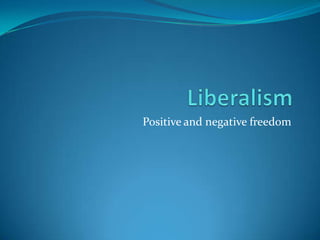
Positive and negative freedom 1
- 1. Positive and negative freedom
- 2. Isaiah Berlin In his influential analysis of freedom he distinguished between 2 rival concepts – positive freedom and negative freedom This is often portrayed as the distinction between being ‘free to do something’ and being ‘free from something’
- 3. Negative freedom Classical liberals believed in negative freedom ie. non interference – the absence of external constraints upon the individual This conception of freedom is negative in that it leaves the individual ‘at liberty’ to act as he/she wishes, whatever the consequences Hobbes defined freedom as the ‘silence of the laws’
- 4. Negative freedom Poverty, disadvantage and disease may be regarded as misfortunes, but from this viewpoint they cannot be said to limit freedom Ideological implications – those who employ freedom in this negative sense are therefore inclined to support the minimal state and sympathise with laissez faire capitalism
- 5. Negative freedom This classical liberal tradition of freedom reflected in the ideas of the New Right/Thatcherism From this approach freedom is expanded by rolling back the state, encouraging individuals to take greater responsibility for their own lives and circumstances Freedom of choice in the market place
- 6. Evaluation Promotes a ‘survival of the fittest system’ which may undermine equality of opportunity and social justice Council house sales, tax cuts and reduction of state benefits will broaden the realm of liberty Critics – this conception of freedom may simply legitimise greed and grant the weak nothing more than the ‘freedom to starve’
- 7. Positive freedom Flaws of negative freedom led modern liberals to redefine freedom, in order to remain true to core liberal principles and values Concerned with the opportunities available to individuals to realise their true potential Freedom ultimately means being free from the social evils that can blight human existence as identified in the Beveridge Report – want, disease............................
- 8. Positive freedom It recognises social disadvantage (not just law and physical restraint) as an enemy of freedom Positive freedom suggest that liberty can be expanded by welfarism and economic intervention Comes close to identifying freedom with equality of opportunity
- 9. Evaluation Critics – classical liberals and New Right – this principle is linked to the growth of the ‘nanny state’- it allows our interests to be defined for us and so robs us of responsibility for our own lives Positive freedom links closely to socialists and Marx – self fulfilment, human potential